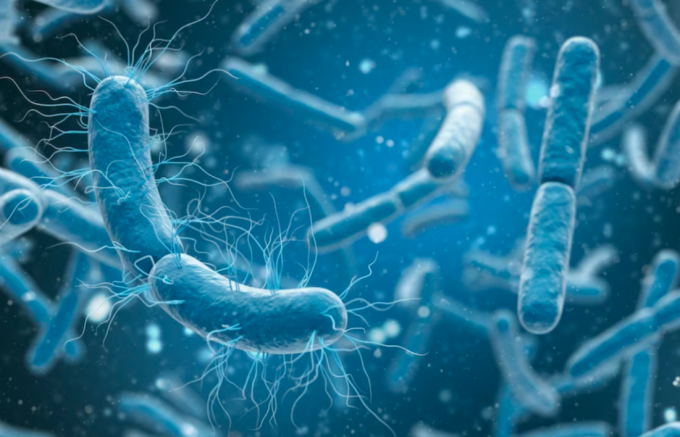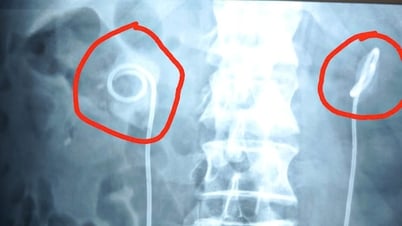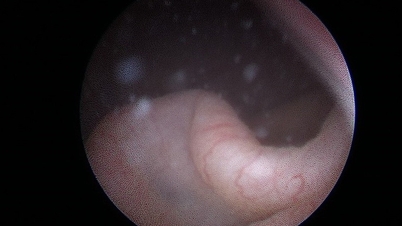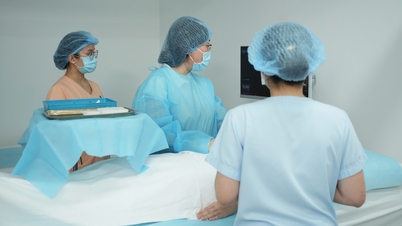Bacterial infections, radiation therapy for cancer, diabetes, prostate tumors, and pregnancy increase the risk of acute cystitis.
Master, Doctor Nguyen Truong Hoan, Center of Urology - Nephrology - Andrology, Tam Anh General Hospital, Ho Chi Minh City, said that acute cystitis is a condition in which the bladder is damaged and inflamed due to urinary tract infection. The disease mostly occurs in women, with symptoms of pain and discomfort when urinating.
There are two groups of causes of inflammation: bacterial (infectious) and non-bacterial. Among them, bacteria are the leading cause of disease such as Escherichia coli (E.coli), Proteus mirabilis, Staphylococcus aureus, gonococcus, Pseudomonas aeruginosa. About 80% of cases of acute cystitis are caused by E.coli infection, the main type of bacteria that parasitizes the human intestinal tract.
Bacteria entering the bladder will attack the mucosa and submucosa (the part that protects the bladder). The damaged mucosa becomes sensitive, causing typical symptoms such as frequent urination and urgency.
Normally, the mucous membrane and the urinary excretion mechanism help eliminate harmful bacteria. When one of these two mechanisms is lost or too many bacteria invade, acute cystitis occurs.
The female urethra, vagina and anus are close together, so disease-causing bacteria can easily infect and enter the bladder in a shorter time than in men.

Bacteria are the leading cause of acute cystitis. Photo: Freepik
Acute cystitis can be caused by certain diseases or radiation therapy for cancer, which weakens the body's immune system and makes it vulnerable to bacterial attack. Diabetes; prostate enlargement or prostate cancer; urethral or foreskin stricture in men; bladder stones or tumors; pregnancy, hormonal changes during menopause... increase the risk of the disease.
Some drugs used in chemotherapy, spermicides, and birth control pills can also cause acute cystitis when the patient uses the drug in the wrong dosage or without a doctor's prescription. Chemicals in feminine hygiene products, if not up to standard, can irritate and cause urinary tract and bladder infections.
Dr. Hoan noted that acute cystitis can occur at any age. Other factors that increase the risk of the disease include unprotected sex, the use of spermicidal gels or creams, women with intrauterine devices (IUDs), people with urinary catheters, and people who have had cystitis.
The disease is relatively benign. Most cases are treated with short-term antibiotics. The disease only becomes severe when the infection spreads to the kidneys with symptoms of high fever, pain in the lower back on one or both sides, and signs of kidney fibrillation. At this point, most patients need to be hospitalized.
Hoang Lien Son
| Readers send questions about urology and andrology here for doctors to answer |
Source link


![[Photo] Prime Minister Pham Minh Chinh meets with Speaker of the Hungarian National Assembly Kover Laszlo](https://vphoto.vietnam.vn/thumb/1200x675/vietnam/resource/IMAGE/2025/10/20/1760970413415_dsc-8111-jpg.webp)


![[Photo] Prime Minister Pham Minh Chinh received Mr. Yamamoto Ichita, Governor of Gunma Province (Japan)](https://vphoto.vietnam.vn/thumb/1200x675/vietnam/resource/IMAGE/2025/10/21/1761032833411_dsc-8867-jpg.webp)
![[Photo] Da Nang residents "hunt for photos" of big waves at the mouth of the Han River](https://vphoto.vietnam.vn/thumb/1200x675/vietnam/resource/IMAGE/2025/10/21/1761043632309_ndo_br_11-jpg.webp)

































































































Comment (0)